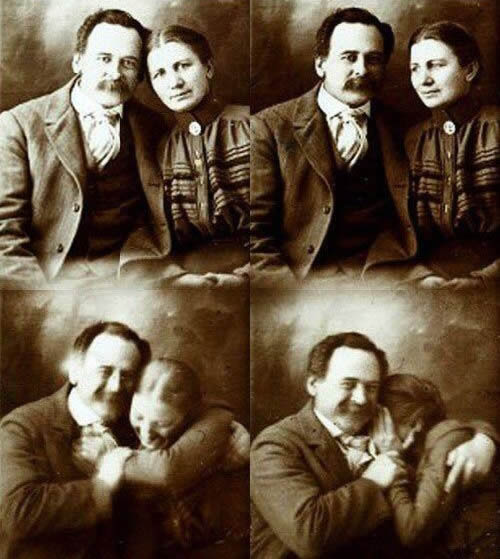DOES PHOTOGRAPHIC TECHNOLOGY SHAPE OUR PERCEPTIONS OF THE PAST . . . AND FUTURE?
Sept 4 2015

Has our perception of past been shaped by the photography technology available at the time? Will the photo technologies we have available now shape what the future thinks of us?
I downloaded this image and quote from @AstonishingPix, a photographic archive on Twitter - well worth following if you are Twitter user.
"A three second exposure meant that subjects had to stand very still to avoid being blurred, holding a smile for that period was tricky. As a result, we have a tendency to see our Victorian ancestors as even more formal and stem than they might have been." @AstonishingPix
This image has made me think about the connection between technological capability and perception. As the quote and photo above point out, the technology available to them meant that the subjects of most portrait photos from that era have stiff and austere expressions and poses. The technological constraints of that time are often lost on us in 2015. We may think that they were just grumpy because they had hard lives. In other words, the challenges of their photographic technology has shaped our perception of the people and the time.
But what does this mean for people from the future who look back on our images, and our era? In the last 5 years we have seen a huge growth in the selfie phenomenon. This seems to be the result of having access to cheap, small, mobile phones with on-board cameras, and online platforms (like Facebook) that allow us to display those images quickly and easily. One article I was reading stated that 90% of images taken on mobile phones were selfies. Does this mean that our grandchildren and great-grandchildren think we were narcissistic? Or has our easy access to cameras meant that we ARE more narcissistic?
A few nights ago I was reading a very interesting TIME article about new photographic technologies. I wonder how these new developments: cameras with GPS sensor, internet connected cameras that can provide economic, social and political layer overlays, cameras with LIDAR data, facial and object recognition sensors, 360 degree cameras, and virtual reality cameras might shape us and what the future thinks of us?
Would be keen to hear your thoughts in the comments below.
Luke